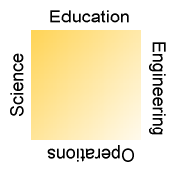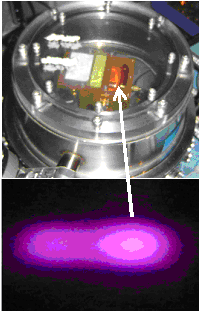HopeCollegeAcademicResearch
Dr. Mork’s research efforts provide opportunities for a broad cross section of undergraduate students. Leveraging experience in Education, Science, Engineering, and Operations, Dr. Mork’s goal is to create new liaisons and cross-disciplinary successes.
Current Work
Dr. Mork is working with Dr. Stephen Remillard of the Physics Department to investigate the effects on, and control of, atmospheric conditions using microwaves. We are studying the breakdown conditions of gases, especially under stratospheric conditions, spectroscopically analyzing the visible emissions, and building an understanding of the impact of high power microwaves on the air chemistry. The outcome of this research will be a model of breakdown and ozone production under high microwave field conditions for stratospheric air.
 Microwave resonator in a stratospheric atmosphere pressure chamber.
Purple glow comes from atomic emission in the resonator gap.
Microwave resonator in a stratospheric atmosphere pressure chamber.
Purple glow comes from atomic emission in the resonator gap.We currently have one student working with us. We are looking for students willing to learn and engage on atmospheric molecular kinetics modeling associated with radio frequency fields. Physical Chemistry or Analytical Chemistry students should contact Dr. Mork. Physics students should contact Dr. Remillard. The most immediate need is assistance to do parameter studies, monitoring both optical emission and atom mass spectra.
This work is currently funded by a Michigan Space Consortium Grant (MSCG), providing equipment and student research stipend. Dr. Mork’s work as a Subject Matter Expert (SME) in the field of Directed Energy (DE) may open other Department of Defense funding that will continue to open this area of research at an undergraduate institution.
Prior experience as a computer automation engineer and 20 years of experience collecting and using analytical information led to a tri-department Automation Computing and Technology (ACAT) grant do develop new technology and teaching methods for tap dance. The Primary Investigator (PI) on this project is Rosanne Barton-DeVries of the dance department, with Eric Alberg of the Theater department staff and Dr. Mork providing technical and educational input. Technical descriptions at DanceACAT. We are looking for students from Dance, Education, Business, and Marketing to develop and package this technology so it can be made available world-wide to other dance departments and studios as shrink-wrapped curriculum.
Add URL for branded orange box here picture of shoes closeup, colorful audio spectrum, and picture of group dance
In these times of increased petroleum fuel costs, alternatives are desirable for civilian use in automobiles. Bio-fuels may be an answer if unintended consequences on farming cultures and forestation can be avoided. The Hope College Operations Department has already converted vehicles to burn diesel-vegetable oil mixed fuel. An even better alternative answer may be fuel cells, which use water and electricity as an energy source, and burn Hydrogen in the combustion process. While teaching at the Air Force Academy, Dr. Mork did research in the field of chemical storage of hydrogen for fuel cell use. He is developing relationships with interested staff of the Hope College Operations department and Dr. John krupczak of the Engineering department to stand up research reducing the concept into operable commercial units. We will need students from Engineering and Chemistry to develop and characterize fuel cell devices.
Add URL for branded orange box here picture of torn open cell, lawn mx tractor, fuel efficient car
Web technology is well established. But a lot of teaching is still done in traditional ways. Working to eradicate traditional college teaching is inappropriate. However, paying attention to new ways that work is smart. Ironically, as social web environments flourish (myspace, facebook), they are developing an uncanny familiarity to even older learning community paradigms such as mentor / guild type relationships. I am communicating with two separate projects with Dr. Delmar Larsen of UCDavis and Justin Shorb (graduate student Hope '04 alumni) at the Univ Wisconsin to develop web-ish, wiki-ish, peer-based educational and evaluation environments. One is emphasizing coherent presentation of disparate web content, the other is emphasizing peer content creation.
Add URL of screenshots
Unique to my presence at Hope College is that I am heavily invested in the Natural Arts and Sciences division, and also, the Residential Life office. I spend time with students during the day and night. This dual-track relationship with college students started when I was at the Air Force Academy and also volunteered for various student summer field studies. Life is not just work at the lab. Life and college learning is about.. well .. your entire life. If you're neglecting some part of who you are, you have room to improve. Your time on this terrestrial ball called Earth may be best lived when you successfully integrate multiple facets of work and personal relationships. I'm pleased to know two other people working to draw this dichotomy together. With Dr. John Jobson, leading the Residential Life office, and Dr. Steve Vanderveen, Director of the Center for Faithful Leadership, I'm investigating possible residential living-learning communities.
So, that's what I do. The spirit of how I do it is a collaborate effort, brokering skills from widely varying disciplines and experience levels. If you are a college student and interested in doing research with me, come talk. Your interests may provide the vector for the next research grant I write!
Prior Work
Building and Launching Satellites at USAFA - write more. For now, check http://increa.com/space/index.htm.Storing Hyrdrogen in Chemical Matrixes - write more.
Hybrid Solid Rocket Motors - write more.
Created by brian. Last Modification: Friday 05 of September, 2008 16:21:40 CDT by brian.